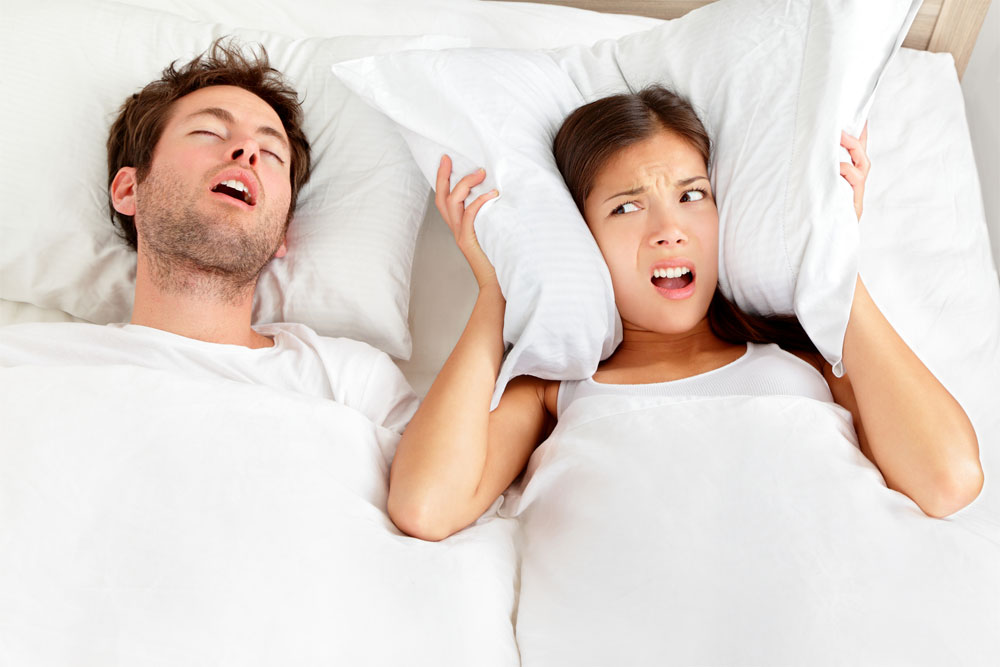Sleep Apnea and Its Relationship to Snoring
Sleep Apnea May Affect Memory of Everyday Events, Studies Show
July 6, 2016Sleep Apnea in Infants: Everything You Need to Know
July 20, 2016Sleep apnea can be identified by a number of symptoms, one of the more obvious being snoring. Nearly fifty percent of adult’s snore occasionally while around twenty-f ive percent of adults have shown to habitually snore. Typically studies show that snoring tends to occur more frequently in males than females, however, it also is common in people who are overweight.
ive percent of adults have shown to habitually snore. Typically studies show that snoring tends to occur more frequently in males than females, however, it also is common in people who are overweight.
Snoring generally indicates that breathing is becoming obstructed in one way or another during sleep. This could be occasional due to a cold or virus that causes tonsils or nasal passages to swell, or it could be caused by obstructive sleep apnea. If you or your partner seems to be habitual snorers, then it’s a good idea to look into the other symptoms of sleep apnea and speak with your doctor about getting tested for the dangerous sleeping disorder.
What Exactly Causes Snoring?
Snoring is most often caused when air is not permitted to flow freely. At the back of the mouth and nose the tissue is soft and can easily collapse where the tongue meets the soft palate of the upper throat. These areas can come together or vibrate during breathing to cause the noise identified as snoring.
Most often obstructive sleep apnea and snoring are noticed in people who have poor muscle tone in this easily collapsible area. Alcohol and sedatives can also over-relax the area and increase the chance of snoring and sleep apnea. It’s also common in people who are significantly overweight and have bulky tissue in the throat. Enlarged tonsils and adenoids can also contribute to the problem by narrowing the airway. Other genetic factors such as a longer soft palate or uvula can also cause a narrow opening between the nose and the throat which can result in snoring.
While illness and allergies can often cause snoring due to a stuffy nose, there can also be slight deformities in the nasal septum or the nose which can also cause obstructive sleep apnea. For example, a deviated septum is a common cause of snoring as well.
Why Snoring and Sleep Apnea Are Serious
The interruption of sleep due to a blocked airway, also known as obstructive sleep apnea, is a very serious condition that can cause several long term health issues if left untreated. Typically, these sleep apnea episodes are a cessation of breathing for longer than ten seconds at a time, multiple times throughout the night. When your breathing stops then the amount of oxygen brought into your body lessens, resulting in lower blood oxygen levels. These lower oxygen levels cause your heart to work harder than it should at a time when it should be beating slow and steady.
When you have a sleep apnea episode, your body may wake you up without you even remembering. This can cause excessive drowsiness throughout the day making it difficult to concentrate and focus. Sleep apnea results in a lack of quality rest which not only can impair your job performance but can also make you a danger behind the wheel.
The added strain on your heart also increases your risks of developing heart disease, having a heart attack, having a stroke, developing diabetes, along with many other serious health conditions that have been linked to sleep apnea.
Treatment Options for Snoring and Sleep Apnea
Thankfully, the seriousness of sleep apnea doesn’t have to cause you to live in fear. There are very effective ways of treating sleep apnea, which also will treat your snoring. Most commonly, obstructive sleep apnea is treated using a machine that creates a slight amount of positive pressure that flows through a mask that fits over your nose while you sleep. This machine is called a CPAP machine. The gentle pressure helps to keep your airway open throughout the night to eliminate sleep apnea episodes and help you, your heart, and your body get a full night of restful sleep.
Other treatment options for sleep apnea that can also resolve your snoring issue include specially designed mouth appliances that reposition your jaw to ensure your airway doesn’t collapse as you sleep. Some patients also require surgery to treat their sleep apnea most effectively. These surgeries can include deviated septum repair or the removal of soft palate tissue.
Lifestyle changes can also help treat the sleeping disorder. By maintaining a healthy diet and exercise you may be able to lose weight and develop muscle tone which reduces your risk of sleep apnea and snoring. You can also change your routine to avoid any alcohol, sedatives, or antihistamines prior to bed time. Elevating the head of your bed a few inches and sleeping on your side rather than your back can also reduce your sleep apnea episodes.
Sleep apnea can have detrimental effects on your body if left untreated so it is important that you seek out your doctor if you believe that you may be suffering from sleep apnea.
